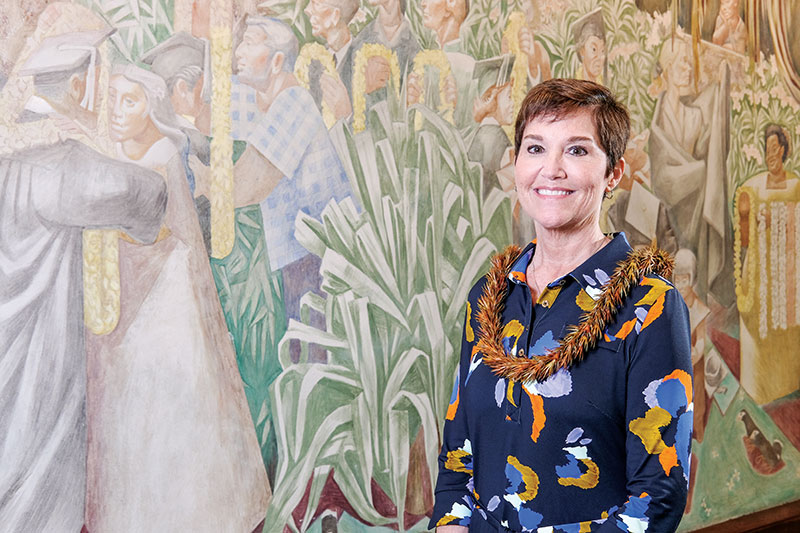Leading and learning

As the new president of University of Hawai’i, Wendy Hensel wants to bring a coordinated data-driven approach to student success. | Photo by Lawrence Tabudlo
For as long as she can remember, Wendy Hensel says, she’d wanted to be a teacher and a lawyer. So, when she saw an advertisement for a non-tenure-track law professor position at Georgia State University in the early 2000s, she thought, “This could be fun.”
Thus began, perhaps, the journey that would eventually bring her to the University of Hawai‘i.
On Jan. 1, she officially stepped into her role as the 16th president of the 10-campus system, the only public institution of higher education in the state.
UH manages a billion-dollar budget, is home to more than 50,000 students statewide, and employs thousands of professors, assistant professors, researchers, administrators, staffers and contractors. Its flagship Mānoa campus comprises 17 schools and colleges, including Hawai‘inuiākea School of Hawaiian Knowledge, Shidler College of Business, William S. Richardson School of Law and John A. Burns School of Medicine. It also operates seven community colleges and other education centers across the state.
Hensel has begun touring the UH campuses. She says she wants to meet with stakeholders to determine how to best address the needs of those she will be serving. It will be a continuation of the work she started when she moved to the islands in December. She arrived in her new home in time to attend UH-Mānoa’s commencement ceremony, taking in the sights and sounds from the stands.
“Overwhelmingly, what I’ve heard is how important (UH) is to every single person in this state,” she says. “It’s really quite extraordinary. It’s humbling and inspiring. This university touches every aspect of life in Hawai‘i and what that means is what we do is important.
“And I think the feedback I’ve gotten so far is just the importance of being present and visible and part of the community.”
Hensel has some big ideas for how to move UH forward.
“In terms of more strategic initiatives, some early ideas are to really look at student success and graduation retention rates,” she says. “There has been some advancement in that area with technology that has not been implemented here that I think could be significant in moving the needle.
“Workforce development is obviously a key priority across the state and we’re doing good work in that space, but I think it could be elevated if it’s systematized and integrated across the different islands.”
But to understand how she sees the path forward, it may help to go back to her time at Georgia State.
Although Hensel initially joined Georgia State as an instructor, she was soon tapped for bigger roles, and eventually found herself working with Tim Renick. Renick, who oversaw student success at Georgia State, is known nationally for his data-driven approach to addressing equity gaps and improving graduation retention rates.
“I loved being able to touch the minds, if you will, being engaged with people who were excited to be there and hungry to be there,” Hensel says of her time as a professor. “And these were not privileged students. These were students who were sacrificing to be there and had to really want it.
“I just admired them tremendously and just wanted to do anything I could to support them on their journey.”
She describes Georgia State University as one of the most diverse universities in the nation and notes that many of its students come from lower socio-economic backgrounds.
“Modern universities were not developed to be easy for students to navigate,” she says. “(But) it’s so ingrained in the background of how we do business that we don’t even see the challenges and barriers that are created for students navigating the system.”
By shifting from teaching to administration, Hensel saw the potential to make a bigger difference for more students.
“The thing that’s always driven me is impact,” she says. “To have what you do matter in some important way, to be able to use your talents to advance other people.”
That drive to make an impact is what took her to City University of New York, a 25-campus system that manages a nearly $5 billion budget and has enrollment numbers topping half-a-million in degree and non-degree programs.
Hensel says she couldn’t pass up the opportunity to become provost of one the largest public university systems in the country. While there, she led the effort to create seamless credit transfers for students within the CUNY system moving from community to senior colleges.
She also got to build on what she’d learned at Georgia State.
“It’s using all of the information we already have (because) we have it, we just don’t track it in ways that tell us the story of the student sitting in front of us,” she says. “And so, we can’t glean the information in a way that’s usable to an adviser at the time when it’s most useful to a student.”
She adds, “One of the systems Georgia State actually pioneered, that actually became more integrated (at other universities) is EAB Navigate. It began at Georgia State and I know the Mānoa campus is using it to some extent, and the community colleges are beginning to have a conversation (about using it).”
EAB Navigate is a customer relationship management platform that connects faculty, staff, administrators and students in a network designed to support students from the beginning of their college careers until they graduate.
“A very simplistic example would be when you sign up for a course that doesn’t advance your degree completion,” she says. “Did someone tell you at that moment, ‘Hey, are you interested in this? This is not going to move you toward getting the actual degree or certificate you signed up for.’ What we found is that students often never found that out until they already signed up for the class or had passed the drop deadline and would lose their financial aid.
“So (EAB Navigate) would immediately trigger the moment you do this: ʻHey, you know, did you mean to sign up for this? If not, you may want to change it.’”
Online courses and artificial intelligence also play important roles in the path forward Hensel envisions for UH.
“The explosion of artificial intelligence is really something that requires some immediate attention because it touches on everything we do as a university,” she says. “From how we teach our classes, what we teach in our classes (to) what areas of program studies we have to prepare people in the workforce for tomorrow.
“And after speaking with politicians and community members inside and outside the university, there’s a lot of enthusiasm to really home in on what we need to do to be a leader in that space.”
As for online classes, she says it’s not about downgrading or eliminating the on-campus experience, but a matter of reaching students where they are.
“It’s pushing to understand what kind of access is necessary to give the broadest possible entry to students and people in the community to what we have to offer,” she says. “If you’re a working adult, coming to class every Monday and Wednesday at 11 a.m. is just not a reality for you and that may be the difference between matriculating and never accessing a college degree or certificate.
“For many (students), the easiest way will be with an online program. Even if it’s not entirely online, (it’s) the flexibility to have a class online and show up in person, to be able to put together what makes sense for your life.”
Hensel describes her new position at UH as her dream job, one that unites her strengths as an administrator with a community that she has admired for years and considers to be exceptional.
“(My family and I) have been coming here for a long time, at least 10 years,” she says, adding that they even bought a condo on Hawai‘i island. “It’s become a special place for my husband and I … we didn’t just want to be here, we wanted to be of here, to lay down roots and become members of the community in some way, realizing it’s very hard to do that from the outside.”
But while she may have manifested her dream job, it didn’t come without controversy. In an op-ed for Honolulu Star-Advertiser, Hensel defended herself against allegations that she had played a role in retaliating against a black professor at Georgia State. She pointed out that a complaint had been filed against a colleague of hers, not her specifically.
Despite the contention, the UH Board of Regents voted unanimously to make her the next president of the university, and she accepted a three-year contract that came with a $675,000 annual salary, a $7,000 monthly housing allowance, up to $60,000 in moving expenses and a tenure fallback position at UH’s William S. Richardson School of Law.
“I feel an enormous privilege to be part of an institution with such an important mission that is so unique: advancing Native Hawaiians and really infusing indigenous culture throughout everything that we do,” she says. “Learning about that and celebrating that is something I plan to do every day, conversation by conversation, (through) active engagement in our community.”


